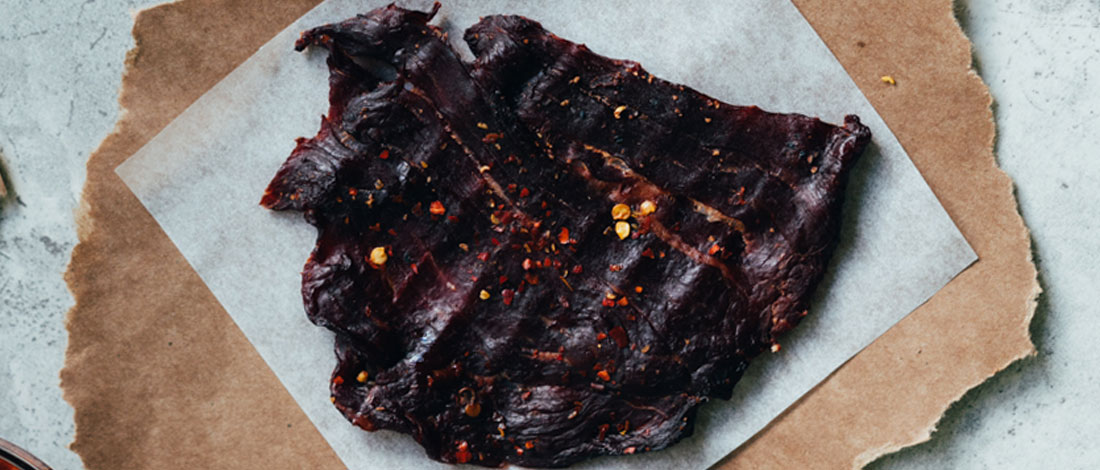The Best Salts for Carnivore Diet
- Best Overall Salt for Carnivore Diet: Jacobsen Salt
- Cheapest Carnivore Diet Salt: Himalayan Chef Himalayan Pink Salt
- Best Black Pepper Salt for Meat Seasoning: Jacobsen Salt
- Best Carnivore Diet Sea Salt: Redmond Real Sea Salt
- Best Pink Salt for Carnivore Meals: Himalayan Chef Himalayan Pink Salt
- Best Unrefined Salt for Carnivore Diet: Pride of India
5 Best Salts for Carnivore Diet
1 - Jacobsen Salt (Best Overall & Black Pepper)
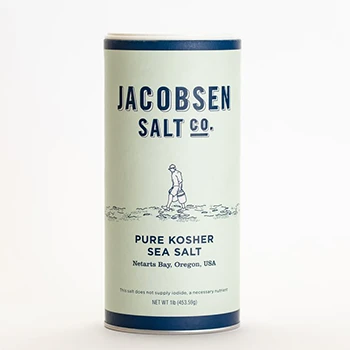
- US-harvested salt
- No iodide
- Can be used on all kinds of food
- Lasts long
- Some packages arrived broken
Who is it for?
Who is it for?
- Health-conscious individuals seeking unrefined sea salt
Who is it not for?
- Those who prefer finely ground salt
Final Verdict
This unrefined sea salt is rich in minerals and trace elements, making it a healthy choice. However, its coarse texture might not be suitable for all cooking purposes.
Jacobsen salt is hand-harvested from Netarts Bay on the Oregon Coast. This US-harvested black pepper salt has a pure taste and clean texture.
I liked that the salt has a warm, floral spice. It paired great with dishes like steak-frites, salt and pepper squid, and chives.
The black pepper isn’t too overpowering and adds depth to the salt. You can use it on meat, eggs, and veggies.
Pro tip: Use Jacobsen sea salt as an overnight brine when smoking beef and pork for the added salt flavor to the meat.
This salt is an essential nutrient and doesn’t contain iodide, which can cause an enlarged thyroid gland [1]. The salt is completely safe to use.
Quick Facts:
- Type of salt : Black pepper salt
- Size : 5.3 oz
- Manufacturing origin : US
2 - Redmond Real Sea Salt (Best Sea Salt)
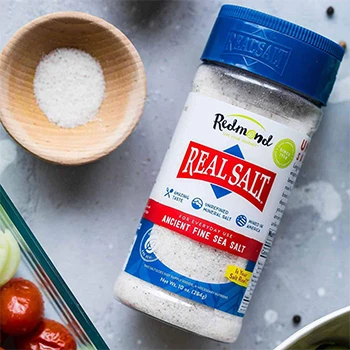
- Isn’t heat processed
- Easy open top
- Can be used for cooking and pickling
- Has non-soluble mineral content
Who is it for?
Who is it for?
- Those looking for a natural, unrefined salt option
Who is it not for?
- Individuals who prefer a salt with no mineral taste
Final Verdict
This salt offers a natural, unrefined option rich in trace minerals. It enhances the flavor of dishes but might have a stronger mineral taste that not everyone will enjoy.
Redmond Real Sea Salt is natural, unrefined, kosher salt. It provides the necessary electrolytes and minerals for a carnivore diet and enriches the dishes. This sea salt has subtle salty sweetness, so it can be used on everything from meat and vegetables to popcorn.
Redmond salt isn’t heat-processed. This means it doesn’t have any additives, only natural components. However, this means there are bits of non-soluble mineral which is crunchy and slightly off-putting to some people. Luckily, this doesn’t affect the salt flavor.
This salt has enough sodium, so you can get the advised daily sodium intake. You’ll have enough energy and reduced cravings for sweets. You can also use Redmond Real Sea Salt on low-carb diets.
Finally, this package is 16 oz, which will last for months. Even though the package is huge, you can use it without transferring the salt, thanks to the easy-open top.
Quick Facts:
- Type of salt : Sea salt
- Size : 16 oz
- Manufacturing origin : US
3 - Himalayan Chef Himalayan Pink Salt (Cheapest & Best Pink Salt)
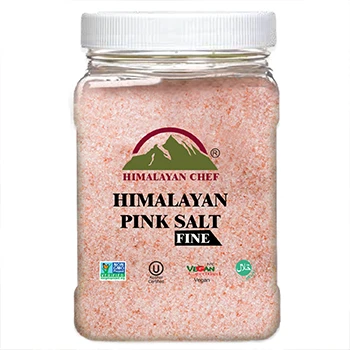
- Ethically-sourced pink salt
- Has 84 minerals
- Comes in two grain sizes
- Comes in a plastic jar
Who is it for?
Who is it for?
- Cooks seeking a pure, mineral-rich salt for various culinary uses
Who is it not for?
- People who prefer white salt
Final Verdict
Himalayan Chef Pink Salt is a pure and mineral-rich option suitable for multiple culinary uses. Its fine grain allows for easy blending, but the packaging could be improved.
Himalayan Chef pink salt is ethically sourced salt. It’s mined from sea beds covered by volcanic lava, which protects the pink salt from pollution.
This Himalayan pink salt is hand-mined, unprocessed, and sun-dried from the Himalayan Mountains in Pakistan.
Himalayan pink salt has 84 minerals and some traces of iron, which provide health benefits, including the prevention of muscle cramps [2]. There aren’t any additives, chemicals, or preservatives.
I liked its ambrosial taste. It gave a nice depth to the meat. Plus, it’s very healthy, so I don’t have to worry about blood pressure or having too much salt.
You can choose between two grain sizes:
- Fine grain — Best for seasoning and baking. Use it in meat, soups, and desserts.
- Coarse salt — You need a salt grinder. You can use it in any dish. It gives more flavor and a textured finish to the dish.
The only thing I didn’t like is that it comes in a plastic jar. I prefer to keep my seasonings in glass jars for higher eco-friendly impact and durability.
Quick Facts:
- Type of salt : Pink salt
- Size : 5 oz
- Manufacturing origin : the Himalayas in Pakistan
4 - Maldon Salt
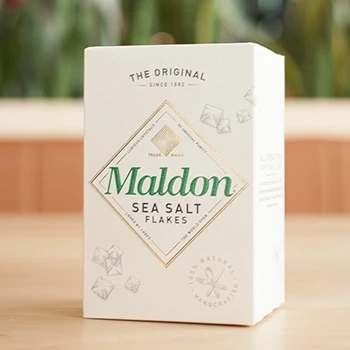
- Hand-harvested
- Flakey salt with mild saltiness
- Comes in a massive package
- Many users report receiving the package with the lid off
Who is it for?
Who is it for?
- Cooks seeking a pure, mineral-rich salt for various culinary uses
Who is it not for?
- People who prefer white salt
Final Verdict
Himalayan Chef Pink Salt is a pure and mineral-rich option suitable for multiple culinary uses. Its fine grain allows for easy blending, but the packaging could be improved.
Maldon makes sea salt flakes that come in a massive 20 oz resealable tub. This table salt is kosher, natural, and handcrafted.
Maldon has been manufacturing salt since 1882, and they use the same artisan methods to this day. The salt comes from the coastal town of Maldon in the UK.
I liked that these are soft, pyramid-shaped crystals with a flakey crunch. The salt flakes release saltiness and give the food a layer of texture and crunch. It has mild saltiness without being too overpowering.
This salt has trace minerals without any additives, which gives you enough sodium chloride and energy. You can use it on meat, smoothies, and ice creams.
Quick Facts:
- Type of salt : Sea salt
- Size : 5 oz
- Manufacturing origin : Maldon town in the UK
5 - Pride of India (Best Unrefined Salt)
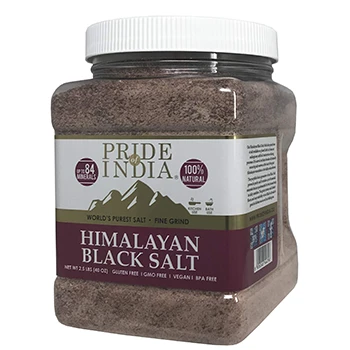
- Natural salt that doesn’t go through a refining process
- Gives color to food and creates an interesting presentation
- Can be used in cocktails
- Strong sulfur smell and taste
Who is it for?
Who is it for?
- Those looking for a unique salt flavor with health benefits
Who is it not for?
- Individuals who dislike sulfurous smells
Final Verdict
This salt offers a unique flavor and numerous health benefits due to its high mineral content. The distinct sulfurous smell and taste might not appeal to everyone.
Pride of India manufactures Himalayan Black Rock Salt from naturally occurring salt deposits in the bed of Himalayan mountains in the Indian subcontinent.
This salt has a blackish appearance. There are 84 essential minerals that provide daily nutrition. You’ll have sufficient sodium, hydration, and balanced PH levels.
This salt contains sulfur. Sulfur is an all-natural mineral deposit that gives depth to your food. However, I found the sulfur smell and flavor to be very strong, so I recommend starting with small quantities if you’ve never had sulfur salt before. This way, the sulfur won’t overpower the taste of food.
Also, this is very coarse salt, so it takes longer than regular table salt to dissolve. It can cause high blood pressure, so be careful how much salt you use.
Quick Facts:
- Type of salt : Black rock salt
- Size : 2.2 oz
- Manufacturing origin : Himalayan mountains in the Indian subcontinent
Buyer’s Guide

Here are some things to keep in mind when buying salt for your all-meat diet.
1. Type of Salt
The first thing you should know when choosing the kind of salt for a carnivore diet is its type.
These are the kinds of salt to choose from:
- Sea salt — Has the purest flavor. It’s processed with natural methods. It has low moisture and is great for seasoning blends. You can choose between fine or coarse sea salt.
- Smoked sea salt — Natural sea salt that’s smoked to add flavor. It has an all-purpose application and can be used in sweet and savory foods.
- Flake salt — This is a great decorative salt. It has a light flavor and delicate texture thanks to the pyramid shape.
- Red salt — This is a traditional salt in Hawaii. It’s collected in tidal pools made of iron-rich volcanic clay. It gets its color from mineral deposits.
- Black salt — Black salt is infused with charcoal. It has a muted flavor, but some kinds have a strong sulfur smell and taste. You can use it for the visual wow factor.
- Pink salt — Comes from ancient sea deposits. Its pink color is great for decorative purposes. You can use it in the same proportions as table salt or sea salt.
2. The Amount of Salt and Carnivore Diet

You need salt on a carnivore diet because salt consumption provides you with sodium and other essential minerals.
Sodium gives you an electric charge when it dissolves in the blood. Moreover, it helps keep the body fluids in normal balance and prevents you from having high blood pressure [3].
According to the USDA, recommended sodium intake is up to 2.3 g per day, which amounts to 5.8g or a teaspoon of salt [4].
But, the carnivore diet is extremely low in carbs, entails a low sodium intake, and has low potassium. Your body needs potassium and sodium to function, which is where salt consumption comes in.
This means adding more salt to the food is safe if you’re on a carnivore diet. A larger package, for example, 15oz to 20oz, will last a long time. You can add salt as needed and make sure you have a sufficient salt intake.
FAQs
Can I Use Salt on a Carnivore Diet?
Yes, you can use salt on a carnivore diet. Salt intake can be beneficial for those transitioning to a carnivore diet, as it can prevent negative effects known as the Carnivore Flu or Keto Flu.
What Seasoning Can You Use on a Carnivore Diet?
You can use these seasonings on a carnivore diet:
- Salt
- Parsley
- Basil
- Thyme
- Sage
- Rosemary
- Dill
- Bay leaf
Why Do You Need Extra Salt on a Carnivore Diet?
You need extra salt on a carnivore diet because it’s a low-carb diet, and our bodies don’t get enough electrolytes. Low salt intake results in low insulin levels, which provokes excess sodium excretion in the kidneys, disrupting the body’s electrolytes.
What’s the Best Salt for You?
All of these are great choices to add enough salt to your carnivore diet. But my vote for best salt goes to Jacobsen salt. It’s harvested right in the USA and has a pure taste and texture. This salt has trace minerals that won’t cause high blood pressure.
Most importantly, the flavor isn’t too overpowering but has a mild taste and floral spice.
As per Carnivore Style's team, this salt is the best choice for a meat-based diet because it can be used in the brine or added straight to the meat for more depth.
Try it yourself and check why this is the best salt for a carnivore diet.
Jacobsen Salt (Best Overall & Black Pepper)
Our #1 Recommendation
Rated With Carnivore Style's Scoring System
- US-harvested salt
- No iodide
- Can be used on all kinds of food
- Lasts long
- Some packages arrived broken





